‘The Other Black Girl’ Composer EmmoLei Sankofa on the Art of the Slow Build

In the new Hulu series The Other Black Girl, genres collide in one of the most complex, terrifying, and awkward settings imaginable—the office. Adapted from Zakiya Dalila Harris’s popular 2021 novel, The Other Black Girl explores issues of race and friendship in the workplace and weighs the cost of compromise and authenticity amidst an inherently broken and biased system. Along with balancing horror, humor, thriller, and sci-fi elements, the series pays tribute to genre and real-world past, present, and future thanks in part to the show’s incredible score by EmmoLei Sankofa.
The story of The Other Black Girl centers around Nella Rogers (Sinclair Daniel), an aspiring editor working in the white-dominated world of publishing at Wagner Books in New York City. Exhausted from being the office’s only Black employee, Nella is thrilled when Hazel (Ashleigh Murray), a charismatic and smart new co-worker from Harlem, appears. Though quickly bonding over their shared love of Burning Heart by Wagner writer Diana Gordon (Garcelle Beauvais), Nella soon discovers that Hazel is not all she appears to be. Before long, Nella finds much more than just her job at risk.
In many ways, Sankofa’s score for The Other Black Girl seems remarkably reflective of the composer herself. Amplifying the show’s more genre-inspired traits, Sankofa’s alluring use of vocals, percussion, space, bass guitar, melody and electronic elements blurs the line between film scores past and present. While wonderfully reminiscent of ‘70-era Giallo and European, jazzy arthouse scores in the vein of Ennio Morricone, Lalo Schifrin, and Krzysztof Komeda, Sankofa’s music feels refreshingly modern and singular.
Along with her composing work on projects like Horror Noire, Three Ways, and Project CC, Sankofa is a frequent producer, musician, and sound designer. A true artist in every sense of the word, Sankofa’s approach to music and the creation of it is as inspired as it is inspiring. Dread Central recently sat down with the artist to learn more about her music, approach, and work on The Other Black Girl.
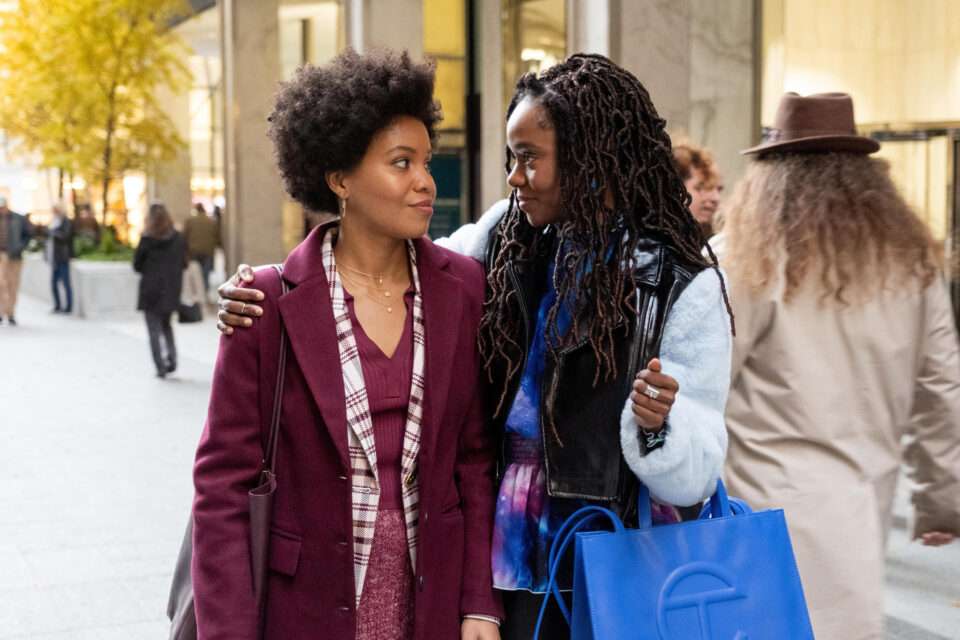
Dread Central: There is still a somewhat limited view of how one becomes a film composer, but many paths can lead there, and all are equally valid. How did you get here? What attracted you to composing for film and television?
EmmoLei Sankofa: I had a professor in college who suggested I go the film-scoring route. He heard a piece that I made for a class assignment and sent me down the rabbit hole of what that would look like. At the time, I was aware of what a composer was in the context of visual media, but I just hadn’t investigated what that would look like as a career. So, when he suggested it, I started going down the rabbit hole to learn more. That was close to my senior year of college.
I went to Savannah College of Art and Design for grad school and was exposed to everything from production sound to post sound to music supervision, music editing, film scoring, all of that. But overall, I’ve been a musician all my life. I started seriously composing music in late middle school, early high school, but that was from the perspective of wanting to be a music producer. I hadn’t even thought about film scoring yet.
In hindsight, that was actually an entry point into my beginning to tell stories through music in my own way. Like I said, I’ve been a musician all my life. I’ve played in symphonic ensembles and marching bands. I’ve been in choir, I’ve been in orchestras, I’ve been in so many things. So even though my pathway into film scoring was a little unconventional, I had the background and the exposure to what essentially contributes to my expression as a composer now.
DC: How has your experience working in those large ensembles benefited you in the career that you are in now and creatively collaborating with others?
ES: It’s definitely the collaborative element, but, as a composer, you are essentially creating and arranging music for large ensembles a lot of times, but sometimes smaller ensembles. So, just the understanding of how to listen to certain instruments, understanding how they fit and how they create certain emotional elements within a piece or within a space or theme, or whatever the case may be. And understanding how to listen and how to play certain things.
Just knowing how to leverage the uniqueness or the timbre of specific instruments to get what you want or to evoke certain things is useful. I don’t think a lot of kids, as they’re coming up, I don’t think they’re mindful of how that’s being shaped when they’re participating in these ensembles, whether they grow into composers or not.
Thinking back over the course of my life, my mom used to take me and my siblings to the Atlanta Symphony Orchestra every year. We would [also] go to plays and all that kind of stuff, too. So, just building your ear in a way that allows you to understand the makeup of what will essentially be in your toolbox as a composer, was a vital piece of my experience and my upbringing.
Where I’m at now, I wasn’t a composer assistant or anything. So, my entry point into the industry was a little unconventional and took a lot of strategy. Mainly because I definitely came up through the indie world. A lot of times, I would do production sound on set to get to the directors before they were thinking about music and build connections with directors in that way. Also, leveraging professional organizations like the Recording Academy, Grammy U, The Composers Diversity Collective, Alliance for Women and Film Composers, and all of these organizations that are in place to help bridge the gap between emerging talent, people who are contemporaries and at the height of their careers, all of those different people and the industry. I just leveraged all of those things and built everything brick by brick.
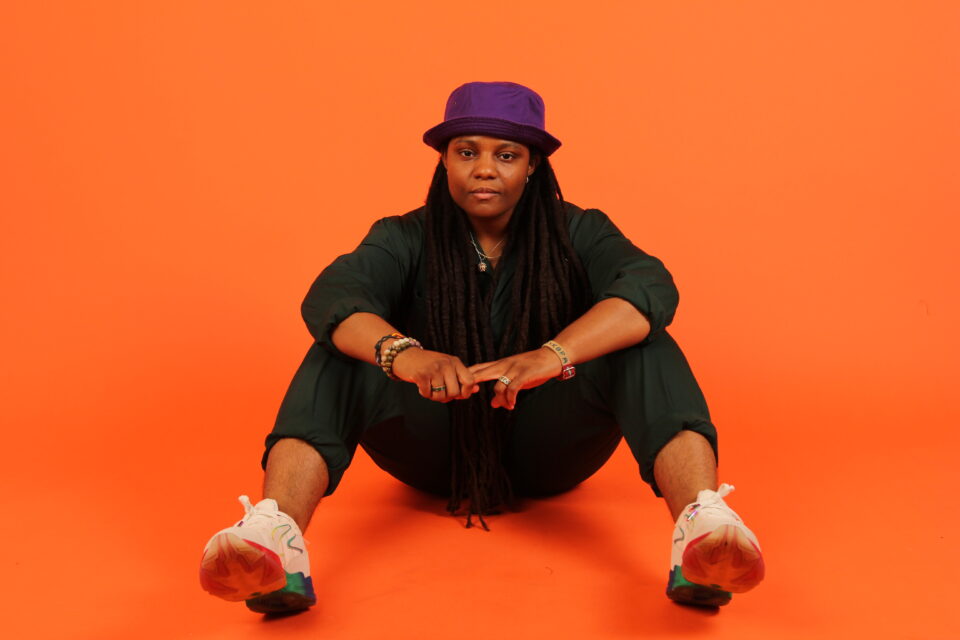
DC: You mentioned your additional skills as a music producer and engineer. With the world being so tech-heavy these days, how have those skills benefited you over the years as a composer, and how critical do you think those skills are these days for composers?
ES: It’s very crucial. Especially because composers at this point in time are required to do so much so quickly. And it’s not necessarily a requirement. It’s really about the fact that until you get to the point where you have the capital to support a team and employ a person to specifically focus on building out your ProTools sessions or mixing the cues as you’re creating them, you have to do a lot of these things on your own.
So, for me, being able to have these skills and leverage them at a high level has allowed me to come in and work on projects. For example, when I worked on Step Up: High Water with Steph Economou, we were co-composers on that series. We worked so quickly that there was no time to outsource and wait for somebody to mix. You have to mix things in real-time as you’re working and arranging, then ship them off for approval.
We did an episode per week. So, really, when you think about it, we actually only had, like, three days to record and create the entire score for one episode. That’s also contingent upon whether or not we had revisions. Thankfully, for that show, we didn’t have revisions, and we didn’t have to spend extra time doing multiple rounds of revisions. But, on The Other Black Girl, that wasn’t the case.
Because this was a new show, there were many different people in the mix who had an idea as to what the music should sound like and what it should feel like. There’s a lot of apprehension around new shows because people want to get it right out of the gate. You have the network saying, “We want these things,” and the writers saying, “Well, this is our vision.” Then you have me, bringing my organic expression and expertise to the table, and I’m giving my ideas about what I think it should sound like. It’s a mix of all those things until everybody feels comfortable with what we arrive at.
You’re also not always able to record a score in a studio. A lot of scores these days are fully “in-the-box” or hybrid scores, which means they’re a blend of real musicians and in-the-box stuff with sample libraries. A lot of my scores more recently have been hybrid versions because I’m moving up the chain a little bit to where there’s more of a budget to be allocated to hiring musicians and all of this stuff.
You don’t necessarily have to use [those skills] all the time when there’s space for you to outsource. That’s great because it gives you more creative resources to physically execute the composition. But it is very crucial to develop those skills so that when you need to take them out of the toolbox, you can.
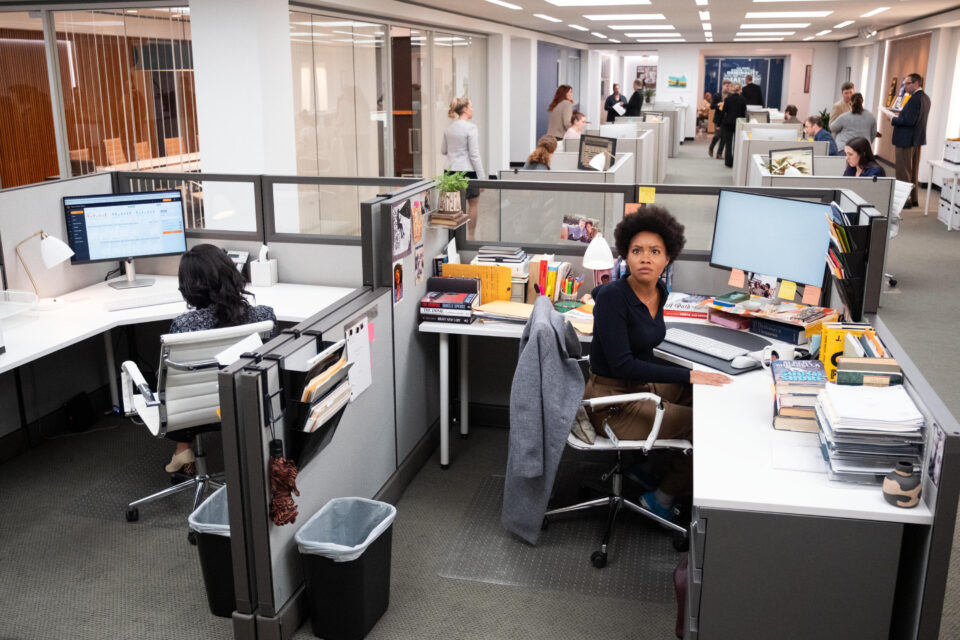
DC: Let’s talk some more about The Other Black Girl. Where did you come in on the show, and where did your involvement fall in that production pipeline?
ES: When they were in pre-production, my agent shared it with me. For some shows, you build a reel based on what the writers or the creative team has in mind for where they want the music to go or how they want it to sound. So basically, we got a reel together, pitched it, and they ended up selecting me from all of the composers. So when they got ready to actually begin, we were having discussions when they were shooting.
I started generating ideas, and I was reading scripts. But a lot of times, that stuff is completely evolving as they’re shooting. You get on set, and some things might not work. For The Other Black Girl, there were definitely days when they had to reshoot entire episodes and rearrange the script and stuff like that. Things just happen. They were shooting in December, and I really started rolling up my sleeves in March once they started doing assembly cuts and stuff like that. I kind of got an idea of what things were looking like and how things were being cut together.
DC: I would love to discuss Nella, as she is truly the heart of this show, and your music feels so intimately tied to her. How did her character and her wild story influence the music and some of your creative decisions?
ES: So Nella is this quirky young lady. As you see the show evolve, you start to see her unravel a bit. She feels on top of the world initially because she’s doing well at her job. Then we immediately see Hazel come and shake that aura and all of that feeling in the office.
So, for me, the things that I capitalized on for Nella were highlighting her quirkiness and her apprehension in relation to Hazel. In the midst of her quirkiness, there’s a part of her expression that is very comedic. You know, those people who are funny, but they don’t realize that they’re funny. Their mannerisms are just funny. You’re always kind of laughing at them, but they think you’re laughing with them. So I kind of capitalized on that.
Also, of course, leveraging her fear and her being on edge as we move through the story. She’s going through the motions of trying to figure out if she can trust Hazel, she’s trying to understand where her place is, what happened to Kendra Rae, and just all of the dynamics of what’s influencing the decisions she’s making in relation to all these characters that are coming at her in different ways. Even her understanding of Malaika, her friend, and how she’s trying to give her the real about what she’s perceiving about Hazel and all of the dynamics in the office. But she’s just not getting it.
The keyword that I actually discussed with the writers was ambiguity. Creating a theme for Nella that was ambiguous was important because we needed to toe the line between comedy, thriller, and horror. Being able to mix and match and leverage the motifs in one element and then switch it and make you laugh or hit comedic beats was really important. So that’s kind of how I organized my brain around what I created for Nella.
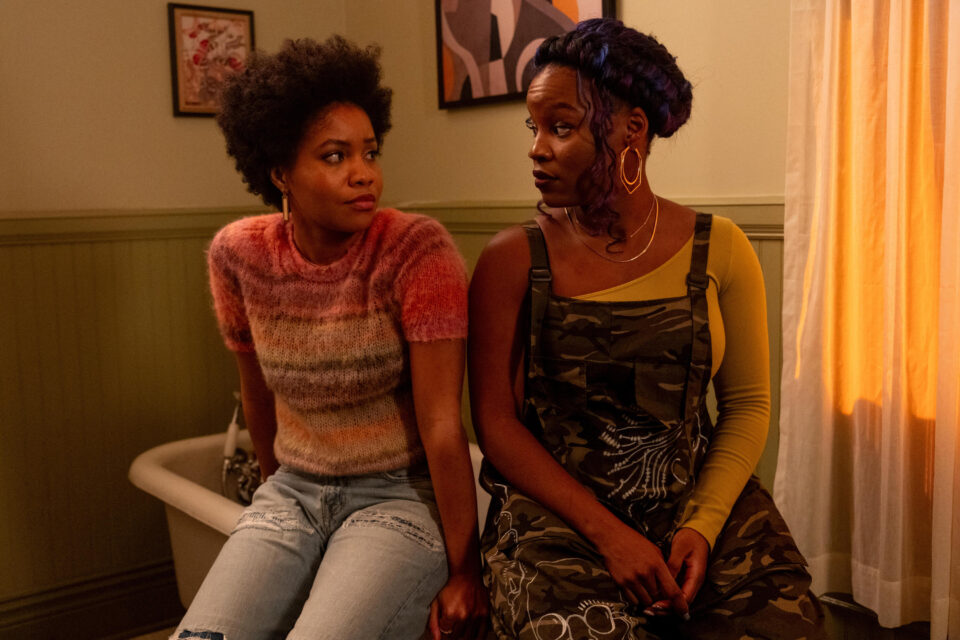
DC: One (of many) things I enjoy about this score is your use of space. Not only the space between notes but how you embrace physical space and the sound of the room.
That said, I’d love to hear your philosophy or thoughts on space as a compositional tool and the general value of traditionally “non-musical” elements to you personally as a composer.
ES: I love this question because I’m a huge fan of John Cage, right? So, John Cage’s philosophy was that, essentially, everything we do is music. That’s leveraging the sounds in our environment and the idea that the performance of a work is never the same because the environment you perform it in is always different. So, for me, when I work, it’s a combination of understanding when I’m thinking about building the world and how people perceive the work.
In terms of leveraging silence, when I’m working with people, I’m always like, “We don’t need music for every single moment. We don’t need music to tell people how to feel for every single thing.” I’m always advocating for more moments of silence when it makes sense. I believe in giving things breath. Silence gives purpose to the music in a lot of ways. It’s almost like a “we don’t appreciate the sun without the rain” situation.
I mentioned earlier that I went to SCAD for grad school, and I got my MFA in Sound Design. That background is really helpful because, a lot of times in my work, especially in this genre, you have a little bit more flexibility to blur the lines between sound design and score, which could be a pro or con, depending on who you ask.
For this score, some of the electronic elements were not necessarily fully electronic. They were acoustic instruments that were used unconventionally or stretched away from their original timbre. For example, brass or brass ensembles sometimes can sound like a train or the subway. So, I leveraged a lot of those textures for the subway scenes when we’re hearing that long drone.
Again, it goes back to my experience playing in large ensembles, where you understand the way a sound can be used and the fundamentals. That then informs where you can take it and how you can stretch it far beyond what people are used to hearing it as. I know I hit a lot of different points, but that’s a rounded view of my approach and how I think about silence and even the mix between sound design, score, and all of that.
DC: You mentioned John Cage as an influence. Thinking about that type of avant-garde approach to music in relation to what you created for The Other Black Girl, did you implement any sort of indeterminacy into the score?
ES: Oh, man. So, first of all, I have a project that I released in 2013 called Indeterminacy, which was inspired by John Cage’s indeterminacy. Essentially, the idea behind that was acknowledging the performance of a work is always different because it’s a different listening and it’s being played in a different environment. So for me, building that project, that was the indeterminate. Those were the indeterminate elements, but the music was more digestible, and it wasn’t avant-garde.
So, fast forward. John Cage did graphic scores and allowed musicians to have flexibility in terms of expression and the performance of the work. In my work, I use Morse code as a compositional device and somewhat as a graphic score to build out themes and motifs. So the vocal stuff was Morse code. We have Nella’s Theme, and Hazel and Nella have a theme. And, I built that out with my voice, but you’ll also hear some of the choir vocals that perform those motifs as well.
In most of my work, and this started when I created this album called Geometry, I started incorporating Morse code as a compositional device and started weaving it into my work. Basically, it gives me the flexibility to have more variation with the theme. When you see the dots and the dashes, you can assign any time signature. You can play it as slow as possible or as fast as possible. You can build out pitches and chord structures. It doesn’t lock you into what somebody might specifically build out on a page.
So, there are times when I will assign certain parameters because I want something very intentional and deliberate. And then there are times where I’ll bring musicians in and have that as the groundwork for their expression and have them interpret it. There’s the baseline rhythm and the performance of that actual thing that I’m spelling out, but then the musicians are free to add variations as long as it stays within that framework. I leverage that a lot, especially on The Other Black Girl.
A lot of composers play violin or piano. I play a little bit of piano, too, but I’m largely a percussionist, and I use my voice a lot. So when I’m coming up with things, it starts with me singing it or tapping a rhythm, and then I evolve it and grow it into something different. That’s how some of the influence of John Cage’s process has found its way into what I do.
And, I’m very cognizant of time. I don’t know what you believe, but [I believe] reincarnation and the evolution of ideas is constant, and it flows. Once someone leaves this earth, their ideas are still floating here. I feel like when people leave or come, it’s like things are jumping. And even when they leave things behind for people to discover, it’s like a transfer of energy in a way that’s like, “Continue this thing for me.”
So I pick up a lot on that, and I’m very mindful of what comes into my awareness, and I know that it doesn’t on accident. I just follow my curiosity in that way and grab on to things that resonate with me and that strengthen my expression. Hopefully, when I leave this earth, someone can pick up my work and do the same, you know what I mean?
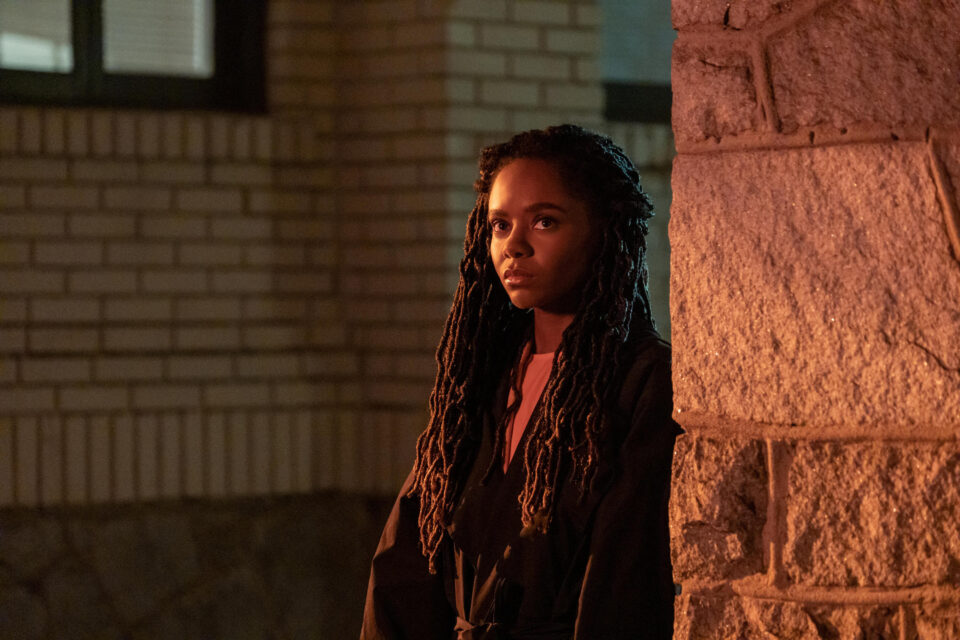
DC: That is fascinating, especially when framing it within the larger history, tradition, and mainstream approach to film music. Do you ever struggle or find yourself confronted with people who have a preconceived idea of what a film score should sound like? How do you deal with that and open their minds to other possibilities?
ES: That’s an interesting question because there was a point where I got frustrated with that. But then I had to zoom out and realize that whenever I am brought onto a project, I am a supporting element. As important as music is, I’m a supporting element.
So, for me, what I have had to learn how to master is getting someone to trust my input. Some directors and folks articulating their vision for music will admit this, but some won’t — music and sound are the scariest parts of the filmmaking or TV-making process for many people on the visual side because they just don’t know anything about music. And, the ones that do, they’re gems. And a lot of times, they’re more hands-off because they understand. They’re like, “I trust you. You got it.”
I think really what it is about is getting them to trust, but also learning how to communicate at their level. That means communicating about emotions versus the technical aspects of music and what music brings to the table. I’ve found that communicating with them in that way creates this space where they trust, but they’re also open to the ideas and the possibilities of where music can take us on the journey of helping mold the story.
At the end of the day, it’s also trusting the vision of the people who created the thing because they do have something in their mind while they’re working, and you kind of come in at a different point. I just try to respect the conversation that is happening.
Sometimes, I have to put music in places that I don’t agree with, but when you guys see these shows and stuff, you don’t know the backstory in those conversations. So if it resonates with you guys and it feels good to you guys, that’s really all that matters. There are some creative decisions that I’ve had to fight for over the course of my life, so it’s really just building trust. Especially when people are bringing you on at a network level, and they haven’t worked with you before, or they don’t know how you work in this environment.
But once we got really deep into the episodes, it was very much like, “She’s got it. Hands off.” And also, I’ll say, too, when you’re working on network stuff, you have what’s called music editors. A lot of times music editors have worked with the showrunners or directors beforehand to map out where they think music should go and what should flow tonally. By the time I get it, sometimes there’s temp music in and, if I come in really early, sometimes I’ll request not. Or I’ll say, “You guys can do this on your end, but like, leave it blank for me. I just want to know where music starts and stops.” Because when you’re working so fast, that is useful. You need to know how much music you’re making per episode to prioritize your time and map everything out.
But I mean, that’s going to happen for the rest of the time that I’m working in this space. I’ve read so many stories about the different dynamics between directors and composers or showrunners and composers, and it’s different for every project. I’m just open and available, and at the end of the day, we’ll get to something that each person feels good about.
DC: More and more these days, there appear to be two main categories of media composers—independent or small team composers and those connected to a larger shop like Remote Control Productions. What advice would you give a composer debating on which path to pursue? Is there still space for up-and-coming composers to break through?
ES: The big thing that I feel like a lot of artists in general don’t do is that they don’t think of themselves as individual companies, right? Think about Hans Zimmer as a corporation. Hans Zimmer is basically a corporation. He’s the CEO of his ship, and CEOs are generally the face of the company. They make high-level deals. They are at the dinners. They’re doing the public announcements and all of these things. But then there are the people under them that they’ve put in position and delegate certain tasks to make things run.
When you have large operations, and you’re in demand as much as Hans is, there’s no way possible that you can do what he does at that level by doing it all yourself. One day, a few years ago, I went to his IMDb page, and since the ‘70s, he’s worked on, like, 15 major projects per year. Crazy. That’s the ‘70s, and we’re almost in 2024!? He’s still actively working at a high level. That’s insane. There’s no way that you can work like that without having a team and people under you to make that happen. So he functions as the person or umbrella that generates the core creative ideas, and then he has the people under him focusing on the fine-tuning and the details.
But then you have smaller entities that are very much still working at that level like a Kris Bowers (Bad Hair, Haunted Mansion), who has a smaller setup. He has a team, but he doesn’t have this robust pool of orchestrators and writers and stuff. He may have like, three orchestrators and two additional writers, an assistant and stuff like that, but he’s still working at a very high level, right?
It’s the same concept, but it’s really about what your goals are, how much you want to get done, and how efficient you want to be. Once you get to this level, it’s really about systems. There’s no way that you can work at the studio and network level without having systems and fluid systems in place that help you execute at a high level. That’s one of the biggest things that a lot of people miss the mark on once they get the opportunities: not having the systems in place to handle the demand and the workload and what’s required in terms of quality.
That’s also why a lot of studios and networks are actually worried about taking risks on emerging composers. They haven’t been tried and tested in that environment. So when you get the test, you got to deliver because if you don’t, it’s like, “See. Now, we want to hire John Williams again because he’s tried and true. We know he can deliver.” So that’s really what the dynamic is. You just have to figure out what makes sense for you, your work-life balance, what makes sense for your goals, and how you want to work.
Some people want to focus on doing film all day, all night. Or, they just want to have more control over things. It’s really just understanding which side of the table you want to be on, where you’re trying to go in your career, how you work, what spaces you want to work in, and what’s required to get the work done in those spaces.
I don’t really have any worries in terms of people being able to cut through because the thing is, there are so many variables that go into play that determine how you cut through. There are so many things that have to be in order outside of your talent that determine if you cut through or not. That’s why I realized I needed an agent. I was like, “How are people getting these network projects?” A lot of things were coming to me, but I realized there was a ceiling.
One day, I tweeted Lena Waithe. I’m like, “How can I work on one of your shows?” And she was like, “Have your agent reach out to production.” That was the day the light bulb went off. I said, “Oh, snap. That’s it right there.” There are certain things that you have to have in place for people to take you seriously at the next level, or to even entertain because of the ecosystem that’s built around working at that level. Once you understand that, it’s easier to determine what you need as you’re growing to break through that next level. You just build slowly.
The Other Black Girl is currently streaming exclusively on Hulu in the US and Disney+ in other areas. Additionally, Sankofa’s score for the series is now available via Hollywood Records on all major streaming platforms.
Categorized: Interviews
